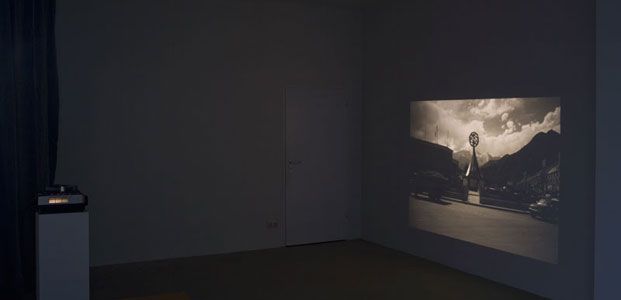Michael Höpfner
TALKING TO ROCKS
Sep 4– Oct 23, 2010

Erosion, identity, memory and dispersion are also the key words within the artistic research of Michael Höpfner. In recent years, the Austrian artist has focused his artistic activity on the practice of geographic and cultural errancy, realized by hiking through peripheral regions and deserted landscapes in different continents. ´Within the structure of cultural analysis undertaken according to a logic of field studies, the artistic practice of Höpfner moves to a field on the border between utopia and failure, between individual freedom and cultural dissolution.
For his work An Outpost of Progress (2009), Höpfner spent eight weeks walking on the high plateau Chang Tang in West Tibet, a region inhabited by approximately fifty thousand people who still live according to ancient nomadic tradition. As a territory in which tourists and foreign nationals are not permitted to walk freely, and being among the least-known regions in the world, Chang Tang was revealed during the artist's exploration to be a location for organized labour camps, fortresses of territorial conquest, motorways and places of environmental and architectural devastation of various types.
Far from any natural idyll or ideal of environmental purity, the Tibetan region documented by Höpfner appears as an outpost of the global decay caused by industrialized culture – the stage for the destruction of deeply rooted culture and traditions which are thousands of years old. Between places of refuge, grottos and huts, the inhabitants of Chang Tang resist the advance of global modernity by defending their own cultural world, which is in dissolution, through the means and ways of nomadic invisibility.
Presented as an installation composed of photographic registers, slides and essential residence modules derived from the ephemeral architecture of the region, Outpost of Progress is the result of the Austrian artist’s radical view of the present day and the space of our imagination. The work denies the idealization of harmony and homogeneity associated with natural areas, by showing the brutality of the antagonism between the settled and the nomadic way of life as well as between tradition and development. On a higher level of interpretative complexity, the codes of Höpfner's research oppose the colonial exoticism inherent to Western society.
He confronts this with an analysis conducted according to a different kind of temporality, in this case erratic walking.
For this reason, the title chosen by Höpfner, Outpost of Progress, is borrowed from a text of the same name by Joseph Conrad from 1897. The biography of this English writer of Polish origin is a paradigmatic example of the Twentieth Century's cosmopolitanism and the conflicting formation of a subjectivity that is culturally dispersed between Europe and the Afro-Asian world. In this sense, Höpfner’s work turns into a translation between different cultures and worlds, something like the staging of the performative unease achieved by the act of walking, which amplifies the profoundness of the point of view and extends the critical consciousness of perception.
Which models and which cultures are able to mediate knowledge of what is different to Western culture? What remains of the ideological schism of the Twentieth Century between the European and primitive world-views? The solitary practice of Höpfner attempts to answer such questions by assuming the nature of an exercise of revolt, able to call into question the rhetoric of collective participation as a culturally and politically efficient form. Breaking the illusions and mystifications of the Western imagination, Outpost of Progress in the final analysis documents a physical and mental space of resistance against global capitalism by experimenting within the rhythm of footsteps, a thesis of a different form of freedom.
Luigi Fassi, Bozen, 2010